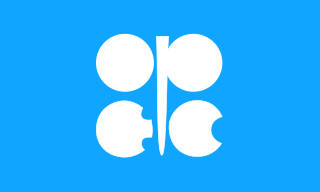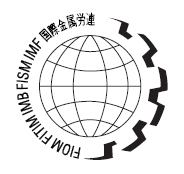
The Fédération Internationale de Football Association, more commonly known by its acronym FIFA, is the international self-regulatory governing body of association football, beach soccer, and futsal. It was founded in 1904 to oversee international competition among the national associations of Belgium, Denmark, France, Germany, the Netherlands, Spain, Sweden, and Switzerland. Headquartered in Zürich, Switzerland, its membership now comprises 211 national associations. These national associations must also be members of one of the six regional confederations: CAF (Africa), AFC, UEFA (Europe), CONCACAF, OFC (Oceania), and CONMEBOL.

The International Confederation of Free Trade Unions (ICFTU) was an international trade union. It came into being on 7 December 1949 following a split within the World Federation of Trade Unions (WFTU), and was dissolved on 31 October 2006 when it merged with the World Confederation of Labour (WCL) to form the International Trade Union Confederation (ITUC).

The World Federation of Trade Unions (WFTU) is an international federation of trade unions established in 1945. Founded in the immediate aftermath of World War Two, the organization built on the pre-war legacy of the International Federation of Trade Unions as a single structure for trade unions world-wide, following the World Trade Union Conference in London, United Kingdom.

The Organisation of Islamic Cooperation, formerly the Organisation of the Islamic Conference, is an intergovernmental organization founded in 1969. It consists of 57 member states, 48 of which are Muslim-majority. The organisation claims to be "the collective voice of the Muslim world" and works to "safeguard and protect the interests of the Muslim world in the spirit of promoting international peace and harmony".

The Organization of the Petroleum Exporting Countries is a cartel enabling the co-operation of leading oil-producing and oil-dependent countries in order to collectively influence the global oil market and maximize profit. It was founded on 14 September 1960 in Baghdad by the first five members. The organization, which currently comprises 12 member countries, accounted for an estimated 30 percent of global oil production. A 2022 report further details that OPEC member countries were responsible for approximately 38 percent of it. Additionally, it is estimated that 79.5 percent of the world's proven oil reserves are located within OPEC nations, with the Middle East alone accounting for 67.2 percent of OPEC's total reserves.

The Cooperation Council for the Arab States of the Gulf, also known as the Gulf Cooperation Council, is a regional, intergovernmental, political, and economic union comprising Bahrain, Kuwait, Oman, Qatar, Saudi Arabia, and the United Arab Emirates. The council's main headquarters is located in Riyadh, the capital of Saudi Arabia. The Charter of the GCC was signed on 25 May 1981, formally establishing the institution.

The Saudi Arabia national football team (SAFF) represents Saudi Arabia in men's international football. They are known as Al-Suqour Al-Arabiyyah and sometimes Al-Suqour Al-Khodhur, a reference to their traditional colours of green and white, and represent both FIFA and the Asian Football Confederation (AFC).

The International Metalworkers' Federation (IMF) was a global union federation of metalworkers' trade unions, founded in Zürich, Switzerland in August 1893. As of 2009, the IMF had more than 200 member organisations in 100 countries, representing a combined membership of 25 million workers.

The International Federation of Chemical, Energy, Mine and General Workers' Unions (ICEM) was a global union federation of trade unions. As of November 2007, ICEM represented 467 industrial trade unions in 132 countries, claiming a membership of over 20 million workers.

The World Health Assembly (WHA) is the forum through which the World Health Organization (WHO) is governed by its 194 member states. It is the world's highest health policy setting body and is composed of health ministers from member states.

The International Federation of Building and Wood Workers (IFBWW) was a global union federation of trade unions in the building, building materials, wood, forestry and allied industries.

The Saudi Arabian Football Federation is the football governing body of Saudi Arabia. Founded in 1956, its responsibilities include administration of club competitions and national teams. The founder of the SAFF is Prince Abdullah bin Faisal Al Saud.

Giovanni Vincenzo Infantino is a Swiss-Italian football administrator and the president of FIFA since February 2016. He was re-elected in June 2019 and in March 2023. In January 2020, he was also elected a member of the International Olympic Committee.

Asia Rugby, formerly the Asian Rugby Football Union (ARFU), is the governing body of rugby union in Asia under the authority of World Rugby. Founded in 1968 by eight charter nations, the Union today has 36 member unions in countries across Asia, stretching from Kazakhstan to Guam.
The Global Labour University (GLU) is an international network of universities, trade unions, NGOs and the International Labour Organisation. It was initiated in 2002 and offers master's programs, academic certificate programs and Massive Open Online Courses (MOOC) on sustainable development, social justice, international labour standards and trade/labour unions, economic policies and global institutions.

The kafala system is a system that exists in many Arab countries in the Middle East, including most of the nations on the Arabian Peninsula, which involves binding migrant workers to a specific employer throughout the period of their residence in a country. The same system existed in Israel under the label "binding labour", until that country's supreme court eliminated it in 2006.

The Parliamentary Assembly of the Mediterranean (PAM) is an international organization established in 2005 by the national parliaments of the countries of the Euro-Mediterranean region. It is the legal successor of the Conference on Security and Cooperation in the Mediterranean (CSCM), launched in the early 1990s.
The South African Congress of Trade Unions (SACTU) was a national trade union federation in South Africa.
















